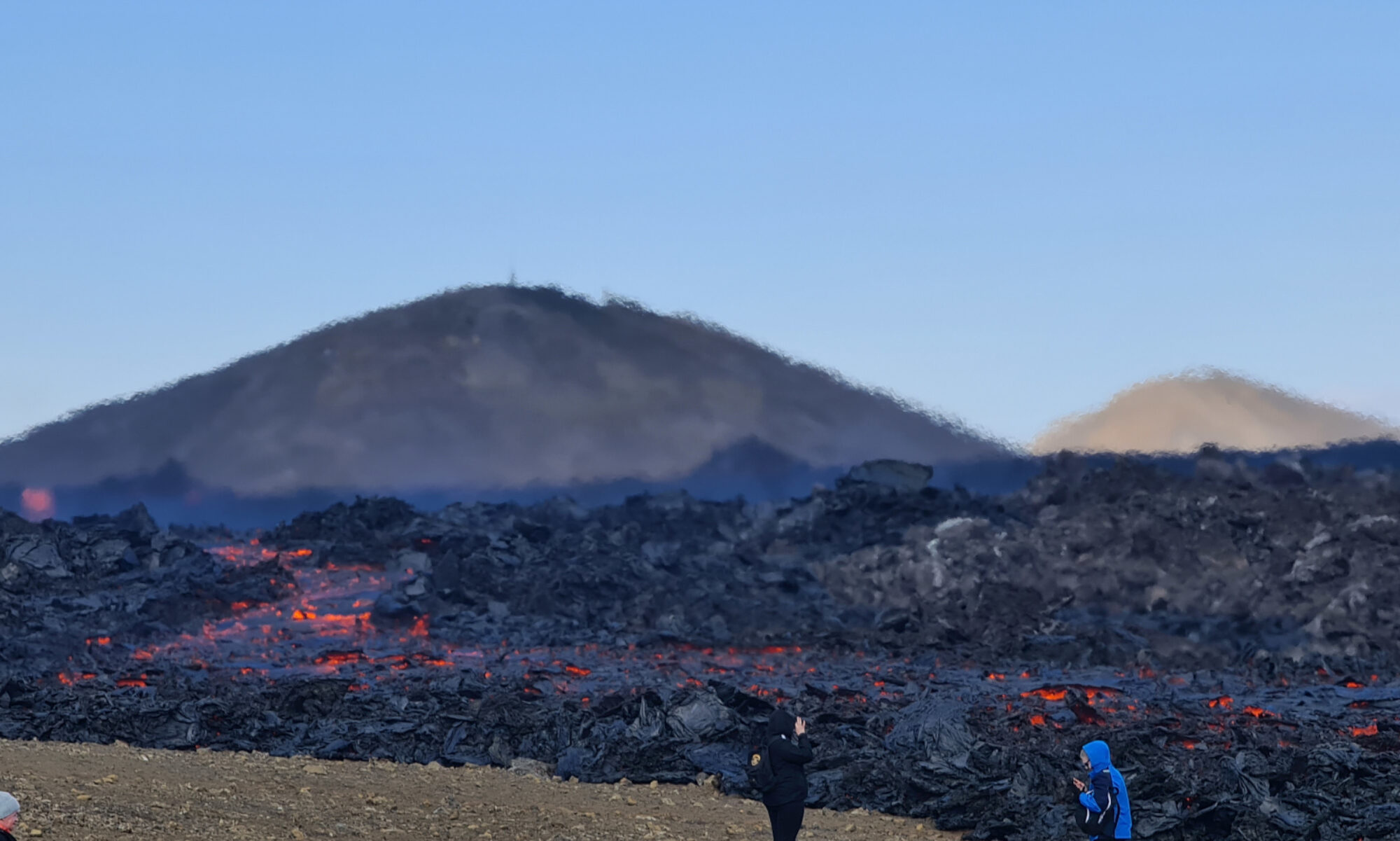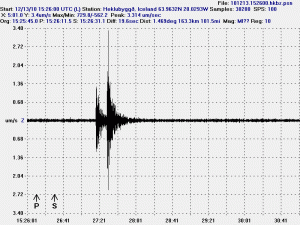I don’t have a lot to write about the earthquake swarm in Krísuvík volcano that took place there yesterday. But according to IMO the largest earthquake was felt in Hafnafjöður and in Reykjavík.
Here are the wave form data of the largest and the second largest earthquakes. There are no location data in this image. As I have not had time to put them into the wave form data.
From Hekubyggð. This is the ML2.8 earthquake.
From Hvammstangi. This is the ML2.8 earthquake. This one is low-pass filtered at 4Hz.
From Hekubyggð. This is the ML2.5 earthquake.
All pictures can be clicked to see the higher resolution of them.




Tungnafellsjökull may be dormant, but is it waking up? A M1.8 eq a few hours ago at depth of 5-6 km (quality ~~90% with a shadow quake 1 second later).
Prestahnúkur, which also is considered dormant, had a few quakes yesterday, but a bit deeper: At depths of 12-14 km they are most likely magmatic.
And those quakes at Þeistareykjarbunga? I don’t think it is a very probable coincidence, that three dormant volcanoes show signs of new activity within a few days. Recalling earlier talk about Iceland entering to a new more active volcanic phase I’d say that “there’s love in the air…”
First of all, thank you Jón! Amazing how similar the 2,8 and the 2,5 quake are. But then it might be normal, I am after all not an expert like you on interpreting them. But nice to see them!
@Jack:
You are forgetting the Tindfjallajökull and Esjan quakes! 😉
Those last 2 where a joke, even though they have quakes they are probably dead.
If we look at Theistareykjarbunga it is used to long intermissions, but there is normally if I understood it correctly some tectonic quakes there now and then. But the 3 last ones have been close to MOHO and nicely placed for magma, but we do not have the wave-forms for those so… But it is probably the worlds largest deposit of vanadium.
Prestahnukur is less dormant, it is known to have had quake-swarms during the last ten years as a paper someone (sorry for forgetting the name) presented yesterday shows. The same goes for the even larger neighbouring Hveravellir (our sixth most dangerous volcano).
But Tungnafellsjökull definitly has to show more before I get interested, it was probably “just” tectonic.
But this is Iceland, anything might go off pretty much anytime, even a new volcano…
Krýsúvík is looking up as the days go by. Now the tremor is at a new record high and have been keaping it up there for 24 hours now. And that is a dormant volcano. http://hraun.vedur.is/ja/oroi/kri.gif
Finally, I have caught up to a current exchange going on!!! I wonder if anyone knows what that orb is over hekla? It’s not there all the time but there are several videos of it on you tube. I saw it on the webcam for the first time last week, now I have seen it three more times since then. I had been reading about it and thinking it was a hoax…until I saw it!!
Eh?
That is just the sun glowing through high thin clouds while the sun is at low angle to the ground. It is called a lensing effect. This is quite normal during the winter this high up north.
Come again when you see four green suns… That is rare. Or a pearl-cloud or something.
Here is a link to it for those who haven’t seen a sun like this (Renato?)
http://www.youtube.com/watch?v=-RKi_NqpLsc
Thanks so much. When it gets huge and shape-shifting, it’s nerve wracking.
Hm, is GFUM in need of de-icing again? Or has the north, east and up-components really moved this much?
http://strokkur.raunvis.hi.is/~sigrun/GFUM.html
I noticed it, too. And look at SKRO also, the bump there died at the same time GFUM started to move…
Hi all, I have been watching this site since the Eyjafyallajokull eruption, but don’t have much other knowledge of this sort of thing. Is there usually so much going on in Iceland or are things a bit more lively than normal?
You mean having small earthquakes?
Yes, this is pretty normal, this island is pretty active in geological terms.
Yeah, welcome to Iceland, the place that is always waiting to explode. Grab a beer and come and sit here at the fireplace while we wait for the next one.
I mean’t having that many small earthquakes and them occuring in swarms indicating something is going on, rather than just a few random creaks.
I live in the UK where we rarely have more than 10 tiny earthquakes a month and most of them are confined to Scotland.
I suppose it is the swarming which would concern me most if I lived in Iceland, because I would feel that might mean something significant might happen – something might go pop! and erupt. I am sure if I lived in Iceland I would be scared of earthquake swarms.
You might want to check out this site: http://www.ijsland-enzo.nl/ijsland/actueel_aard_animatie.asp
This contains animations of all M1+ earthquakes since 1995. If you wobble a bit through it you will see that this activity is really common. 2010 has been a relatively quiet year earthquake-wise.
Wow! Just looked at the animation you gave me the link to. Very impressive – interesting stuff!
Well, I believe Iceland stole our mantle plume from under the UK many many millenia ago. It is claimed it was our plume before and created our British granite areas like Dartmoor and our westerly highland areas, but I am very glad Iceland has it now and not us. I am not sure if Greenland moved over it first and then it tipped back, or whether Iceland has two plumes under it – the one from under Iceland and the one from under Britain. Our plume (now gone) mineralisad the westerly side of our country, so I guess Iceland must be very mineralogically rich?
I don’t think it moved that much. Merely it was bigger once and was under the British Isles as well as under Iceland. Like you say though – they have it all now – we don’t want it here under the UK.
FAO Carl, we have a house by a lake, and like to spend our summers there…moosewatching, bear wrestling…that kind of thing. The fact that there’s naff all there apart from forest and lakes is the appeal, though we do have friends in the gold mining biz. Incidentally, our place is on the resurgent dome of a 1,8 bn year old volcano near Gallejaur. We didn’t know that until last year.
Was it you who has a friend with a notion that the north of Sweden is likely to go boom? Or was that Dan Swe over at Erik’s blog?
Gallejaur is nice, I am usually at Långträsk every summer.
If I might ask, from which part of the world do you herald from?
That was me at Eriks blog.
And I was born and raised in Skellefteå.
I’m a pure amateur when it comes to vulcanology, but I find it very interesting and am learning a lot.
Carl, from the UK. Our summers are in Järvträsk. I love that whole region. I only got to learn a little of the geology of the area this summer. I never understood the relationship between volcanoes and gold/minerals before….actually, my understanding is sketchy at best even now. Fascinating stuff.
In a way volcanology and iron is even more interesting and even less understood. But is it is interesting with rarer minerals to.
We have a very extinct volcano at Hopes Nose, Torquay, Devon, England, which used to vent gold vapour which has crystallised to form fern like structures of gold rich in Rhodium, Iridium and other rarer elements. They are encsed in calcite which surrounded them later in time, so can’t be seen without dissolving the calcite. Of course – there are wardens to stop people collecting it!
Jakey, yes, you are right. I dug out the article I read it in and checked.